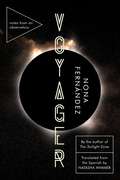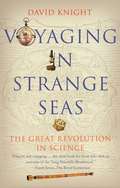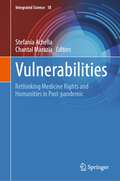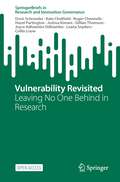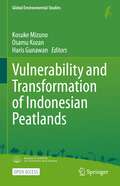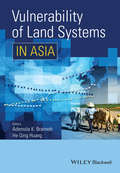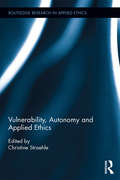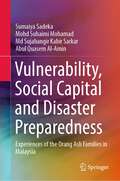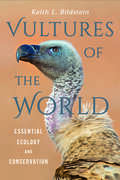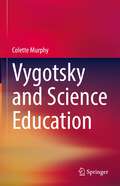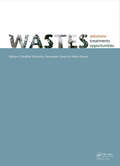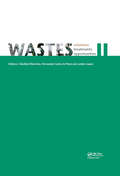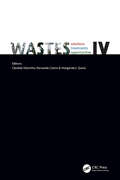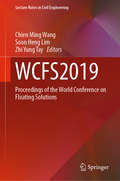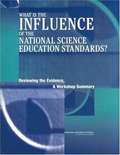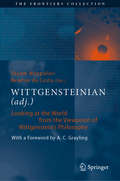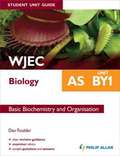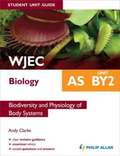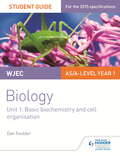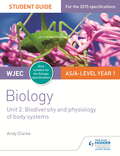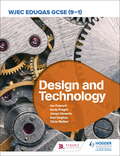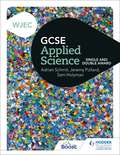- Table View
- List View
Voyager: Constellations of Memory
by Nona FernándezA startling book-length essay, at once grand and intimate, from National Book Award finalist Nona Fernández.Voyager begins with Nona Fernández accompanying her elderly mother to the doctor to seek an explanation for her frequent falls and inability to remember what preceded them. As the author stares at the image of her mother’s brain scan, it occurs to her that the electrical signals shown on the screen resemble the night sky.Inspired by the mission of the Voyager spacecrafts, Fernández begins a process of observation and documentation. She describes a recent trip to the remote Atacama desert—one of the world’s best spots for astronomical observation—to join people who, like her, hope to dispel the mythologized history of Chile’s new democracy. Weaving together the story of her mother’s illness with story of her country and of the cosmos itself, Fernández braids astronomy and astrology, neuroscience and memory, family history and national history into this brief but intensely imagined autobiographical essay. Scrutinizing the mechanisms of personal, civic, and stellar memory, she insists on preserving the truth of what we’ve seen and experienced, and finding ways to recover what people and countries often prefer to forget.In Voyager, Fernández finds a new container for her profound and surreal reckonings with the past. One of the great chroniclers of our day, she has written a rich and resonant book.
Voyaging in Strange Seas
by David KnightIn 1492 Columbus set out across the Atlantic; in 1776 American colonists declared their independence. Between these two events old authorities collapsed--Luther's Reformation divided churches, and various discoveries revealed the ignorance of the ancient Greeks and Romans. A new, empirical worldview had arrived, focusing now on observation, experiment, and mathematical reasoning. This engaging book takes us along on the great voyage of discovery that ushered in the modern age. David Knight, a distinguished historian of science, locates the Scientific Revolution in the great era of global oceanic voyages, which became both a spur to and a metaphor for scientific discovery. He introduces the well-known heroes of the story (Galileo, Newton, Linnaeus) as well as lesser-recognized officers of scientific societies, printers and booksellers who turned scientific discovery into public knowledge, and editors who invented the scientific journal. Knight looks at a striking array of topics, from better maps to more accurate clocks, from a boom in printing to medical advancements. He portrays science and religion as engaged with each other rather than in constant conflict; in fact, science was often perceived as a way to uncover and celebrate God's mysteries and laws. Populated with interesting characters, enriched with fascinating anecdotes, and built upon an acute understanding of the era, this book tells a story as thrilling as any in human history.
Vulnerabilities: Rethinking Medicine Rights and Humanities in Post-pandemic (Integrated Science #18)
by Stefania Achella Chantal MaraziaDrawing from a wide array of disciplinary perspectives and geographical contexts, this volume offers new insights for critically engaging with the problem of vulnerability. The essays here contained take the move from the COVID-19 pandemic, in order to explore the inherent vulnerability of individuals, but also of social, economic and political systems, and probe the descriptive and prescriptive import of the concept.Each chapter provides a self-contained perspective on vulnerability, as well as a specific methodological framework for questioning its meaning. Taken together, the chapters combine into a multi-disciplinary toolkit for approaching the various forms and structures of vulnerability, with a special attention to the intersectional factors shaping the individual experience of it: from gender to age, from disability to mental illness, from hospitalisation to incarceration. The book explores the theoretical richness and complexity of the concept and proposes new analytical approaches to it, before illustrating its multifariousness through empirically grounded case studies. The closing section engages with “the future of vulnerability”, as a hermeneutic, epistemological, and critical-normative perspective to be deployed beyond the domain of global crises and emergencies.The volume is primarily intended as a reference for scholars in the human, social and health sciences. The accessible structure and plain language of the chapters make it also a valuable didactic resource for graduate courses in philosophy, the social sciences and public health.
Vulnerability Revisited: Leaving No One Behind in Research (SpringerBriefs in Research and Innovation Governance)
by Doris Schroeder Roger Chennells Kate Chatfield Hazel Partington Joshua Kimani Gillian Thomson Joyce Adhiambo Odhiambo Leana Snyders Collin LouwOpen access. This open-access book discusses vulnerability and the protection-inclusion dilemma of including those who suffer from serious poverty, severe stigma, and structural violence in research. Co-written with representatives from indigenous peoples in South Africa and sex workers in Nairobi, the authors come down firmly on the side of inclusion. In the spirit of leaving no one behind in research, the team experimented with data collection methods that prioritize research participant needs over researcher needs. This involved foregoing the collection of personal data and community researchers being involved in all stages of the research. In the process, the term ‘vulnerability’ was illuminated across significant language barriers as it was defined by indigenous peoples and sex workers themselves. The book describes a potential alternative to exclusion from research that moves away from traditional research methods. By ensuring that the research is led by vulnerable groups for vulnerable groups, it offers an approach that fosters trust and collaboration with benefits for the community researchers, the wider community as well as research academics. Those living in low-income settings, in dire situations that are summarized with the term ‘vulnerability’ know best what their problems are and which priorities they have. To exclude them from research for their own protection is a patronizing approach which insinuates that researchers and research ethics committees know best. The team from this book have shown that minimally risky and minimally burdensome research tailored towards the needs of highly marginalized and stigmatized communities can be scientifically valuable as well as inclusive and equitable. I congratulate them. Prof. Klaus Leisinger, President Global Values Alliance, Former personal advisor to Kofi Annan on corporate responsibility
Vulnerability and Transformation of Indonesian Peatlands (Global Environmental Studies)
by Kosuke Mizuno Osamu Kozan Haris GunawanThis open access book deals with restoring degraded peatlands to help mitigate global warming, to which SDG 15 and SDG 13 are directly related. The book analyzes peatland degradation and restoration of the Indonesian peatland ecosystem through the integrated lens of resilience, vulnerability, adaptation, and transformation. It sheds light on what constitutes "resilience" of the peat swamp forest, digs deeper into local knowledge in developing the studies on institutions, governance, and ecological conditions that support the resilience of the peat swamp forest to elaborate on the idea of transformation in today's degraded peatlands. While peat swamp forests may be resilient, they remain highly vulnerable. The book analyzes restoration efforts through rewetting, revegetation, and rehabilitation of the local livelihoods with the concepts of adaptation and transformation. The integrated analysis covers fieldwork of more than a decade and various aspects such as agrarian and social changes, biological changes (birds, mammals, and termites), carbon emission, water control, timber use, revegetation efforts, and the Indonesia Sustainable Palm Oil (ISPO) program implementation. It also employs the ideas of vulnerability, resilience, adaptability, and transformation based on expanded studies on peatlands and observations of and participation in multiple efforts to prevent fires and restore the degraded peatland by researchers, the government, non-government organizations (NGOs), private companies, and last but not least, the local people. The discussion includes the period of pre-degradation and several efforts at peatland restoration for a better understanding and analysis of the long-term peatland dynamics.
Vulnerability of Land Systems in Asia
by Ademola K. Braimoh He Qing HuangThis book provides a comprehensive yet accessible overview of land systems vulnerability assessment in Asia - fundamental to the understanding of the link between global change, environmental sustainability and human wellbeing. The extent and intensity of human interactions with the environment have increased spectacularly since the Industrial Revolution. Thus, the global change research community and development practitioners increasingly recognize the need to address the adverse consequences of changes taking place in the structure and function of the biosphere and the implications for society. With a focus on Asia, this book provides an overview of the vulnerability of land systems and the subsequent multiple stressors in this region. The book offers a discussion surrounding the potential causal processes that affect land systems vulnerability and our capacity to cope with different perturbations. It also identifies factors that help to integrate vulnerability assessment into policy and decision-making. • Addresses the complex issues arising from human–environment interactions that cannot be satisfactorily dealt with by core disciplinary methods alone. • Key coverage of a variety of topics from the vulnerability of smallholder agriculture and urban systems to the impact of socioeconomic processes at the sub-regional level. • Coverage of the causal processes that affect land systems vulnerability and capacity to cope with different perturbations are documented. • Focus on integrating vulnerability assessment into policies and decision-making • Includes contributions from leading academics in the field.
Vulnerability, Autonomy, and Applied Ethics (Routledge Research in Applied Ethics)
by Christine StraehleVulnerability is an important concern of moral philosophy, political philosophy and many discussions in applied ethics. Yet the concept itself—what it is and why it is morally salient—is under-theorized. Vulnerability, Autonomy, and Applied Ethics brings together theorists working on conceptualizing vulnerability as an action-guiding principle in these discussions, as well as bioethicists, medical ethicists and public policy theorists working on instances of vulnerability in specific contexts. This volume offers new and innovative work by Joel Anderson, Carla Bagnoli, Samia Hurst, Catriona Mackenzie and Christine Straehle, who together provide a discussion of the concept of vulnerability from the perspective of individual autonomy. The exchanges among authors will help show the heuristic value of vulnerability that is being developed in the context of liberal political theory and moral philosophy. The book also illustrates how applying the concept of vulnerability to some of the most pressing moral questions in applied ethics can assist us in making moral judgments. This highly innovative and interdisciplinary approach will help those grappling with questions of vulnerability in medical ethics—both theorists and practitioners—by providing principles along which to decide hard cases.
Vulnerability, Social Capital and Disaster Preparedness: Experiences of the Orang Asli Families in Malaysia
by Abul Quasem Al-Amin Sumaiya Sadeka Mohd Suhaimi Mohamad Md Sujahangir SarkarThis book addresses increasing concerns regarding the relationship between social capital and disaster, highlighting conceptual definitions related to social capital and disaster, family, community, vulnerability, disaster experience, and preparedness. Focusing on a contemporary case of disaster management in Malaysia, the authors explore and establish linkages between the level of social capital and disaster preparedness among the indigenous Orang Asli people. Taking the case of the Orang Asli families as a point of departure, the book presents solutions for mobilizing social capital for disaster preparedness through multi-stakeholder involvement, promoting participation in awareness programs, ensuring indigenous people’s access to resources, and proposing a prioritization of local values and culture in enabling proper planning and coordination for more disaster-resilient communities in Malaysia, Southeast Asia, and beyond. The book is broadly relevant to cases in similar economic settings where indigenous people are lagging behind in disaster preparedness. An excellent resource for sociologists, this pioneering book collates various concepts and theories relating to social and ecological networks and systems, family resilience, and stress and coping mechanisms. It is relevant to researchers focused on disasters in developing countries, globally, particularly those focused on indigenous communities.
Vultures (Nature's Children)
by Tim HarrisWhere do vultures live? What do vultures eat? How big are vultures? Find out the answers to these questions and learn all about vultures physical characteristics, behavior, and habitats.
Vultures of the World: Essential Ecology and Conservation
by Keith L. BildsteinIn Vultures of the World, Keith L. Bildstein provides an engaging look at vultures and condors, seeking to help us understand these widely recognized but underappreciated birds. Bildstein's latest work is an inspirational and long overdue blend of all things vulture. Based on decades of personal experience, dozens of case studies, and numerous up-to-date examples of cutting-edge science, this book introduces readers to the essential nature of vultures and condors. Not only do these most proficient of all vertebrate scavengers clean up natural and man-made organic waste but they also recycle ecologically essential elements back into both wild and human landscapes, allowing our ecosystems to function successfully across generations of organisms. With distributions ranging over more than three-quarters of all land on five continents, the world's twenty-three species of scavenging birds of prey offer an outstanding example of biological diversity writ large. Included in the world's species fold are its most abundant large raptors—several of its longest lived birds and the most massive of all soaring birds. With a fossil record dating back more than fifty million years, vultures and condors possess numerous adaptions that characteristically serve them well but at times also make them particularly vulnerable to human actions. Vultures of the World is a truly global treatment of vultures, offering a roadmap of how best to protect these birds and their important ecology.
Vygotsky and Science Education
by Colette MurphyThis book highlights those aspects of Vygotskian theory which are most cogent to Science Education, including the Zone of Proximal Development (ZPD), concept development, play and imagination. Whilst these and other Vygotskian constructs apply to both research and practice in all forms of Science Education, this book employs a specific and critical focus on one or two key concepts for each context. Thus play and imagination are explored in depth in the chapter on science in early childhood learning, the ZPD is considered in depth in the primary school science chapter, and concept development in the secondary-level chapter. Chapters on higher education science learning and teaching, science teacher education, informal science learning, science education research, and the scientific endeavour itself draws on those aspects of Vygotskian theory which relate most closely. This book makes an important contribution to Vygotskian theory. Never before has it been applied so widely and comprehensively to the field of science and STEM education. The book is intended for students and academics in science and STEM education and the social sciences. It is also of interest to Vygotsky scholars and those involved in the analysis of pedagogic practice within and beyond science and STEM education.
WASTES 2015 - Solutions, Treatments and Opportunities: Selected papers from the 3rd Edition of the International Conference on Wastes: Solutions, Treatments and Opportunities, Viana Do Castelo, Portugal,14-16 September 2015 (Wastes: Solutions, Treatments and Opportunities)
by Fernando Castro Cândida Vilarinho Mário RussoThis volume presents a selection of papers from the WASTES 2015 conference, a platform for scientists and industries from the waste management and recycling sectors from around the world, who shared experiences and knowledge at the meeting. Covering discussions regarding the balance between economic, environmental and social outcomes, the development of innovative techniques, tools and strategies on how wastes can be transformed into good ideas. Improving both the overall environmental performance and the understanding of the industry impact on the environment, as well as the options analysis for its improvement were key objectives of this conference.
WASTES – Solutions, Treatments and Opportunities II: Selected Papers from the 4th Edition of the International Conference on Wastes: Solutions, Treatments and Opportunities, Porto, Portugal, 25-26 September 2017 (Wastes: Solutions, Treatments and Opportunities)
by Cândida Vilarinho, Fernando Castro and Maria de Lurdes LopesWastes: Solutions, Treatments and Opportunities II contains selected papers presented at the 4th edition of the International Conference Wastes: Solutions, Treatments and Opportunities, that took place 25-26 September 2017 at the Faculty of Engineering of the University of Porto, Porto, Portugal. The Wastes conference, which takes place biennially, is a prime forum for academics and industry representatives from the waste management and recycling sectors around the world to share their experience and knowledge with all in attendance. The published papers focus on a wide range of topics, including: Wastes as construction materials, Wastes as fuels, Waste treatment technologies,MSW management, Recycling of wastes and materials recovery, Wastes from new materials (nanomaterials, electronics, composites, etc.), Environmental, economic and social aspects in waste management and Circular economy.
WASTES: Selected Papers from the 6th International Conference Wastes 2023, 6 – 8 September 2023, Coimbra, Portugal (Wastes: Solutions, Treatments and Opportunities)
by Cândida VilarinhoWASTES: Solutions, Treatments and Opportunities IV contains selected papers presented at the 6th edition of the International Conference Wastes: Solutions, Treatments and Opportunities, that took place on 6-8 September 2023, in Coimbra, Portugal. The Wastes conference, which takes place biennially, is a prime forum for sharing innovations, technological developments and sustainable solutions for waste management and recycling sectors worldwide, with the participation of experts from academia and industry. The papers included in this book cover a wide range of topics, including: - Management of waste streams - Environmental, economic and social aspects in waste management - Logistics, policies, regulatory constraints and markets in waste management - Waste-to-energy technologies - Life cycle assessment and carbon footprint - Biological treatment techniques - Waste treatment and valorization technologies - Circular economy and industrial symbioses - Smart technologies and digital tools in waste management - Recycling of wastes and resources recovery - Wastes refineries - Food waste management and bioeconomy - Plastic waste impacts, management strategies and solutions - Wastes as critical raw materials resources WASTES: Solutions, Treatments and Opportunities IV is aimed at academics and professionals involved in waste management and recycling sectors globally.
WCFS2019: Proceedings of the World Conference on Floating Solutions (Lecture Notes in Civil Engineering #41)
by Chien Ming Wang Soon Heng Lim Zhi Yung TayThis book highlights recent research and developments in floating structures on rivers, lakes, seas and oceans for energy harvesting, aquaculture and farming, leisure activities, infrastructure, industrial plants, real estate and cities, with a focus on sustainably living, relaxing and working offshore. Bringing together international experts and leaders, from both industry and academia it reviews and discusses ocean space utilization, and offers an ideal platform for those wanting to establish new collaborations on floating structure projects.
WHAT IS THE INFLUENCE OF THE NATIONAL SCIENCE EDUCATION STANDARDS?: Reviewing the Evidence, A Workshop Summary
by Karen S. HollwegThe Influence of the National Science Education Standards
WITTGENSTEINIAN: Looking at the World from the Viewpoint of Wittgenstein's Philosophy (The Frontiers Collection)
by Shyam Wuppuluri Newton Da Costa“Tell me," Wittgenstein once asked a friend, "why do people always say, it was natural for man to assume that the sun went round the earth rather than that the earth was rotating?" His friend replied, "Well, obviously because it just looks as though the Sun is going round the Earth." Wittgenstein replied, "Well, what would it have looked like if it had looked as though the Earth was rotating?” What would it have looked like if we looked at all sciences from the viewpoint of Wittgenstein’s philosophy? Wittgenstein is undoubtedly one of the most influential philosophers of the twentieth century. His complex body of work has been analysed by numerous scholars, from mathematicians and physicists, to philosophers, linguists, and beyond. This volume brings together some of his central perspectives as applied to the modern sciences and studies the influence they may have on the thought processes underlying science and on the world view it engenders. The contributions stem from leading scholars in philosophy, mathematics, physics, economics, psychology and human sciences; all of them have written in an accessible style that demands little specialist knowledge, whilst clearly portraying and discussing the deep issues at hand.
WJEC Biology AS Student Unit Guide: Unit BY1 eBook ePub Basic Biochemistry and organisation
by Dan Foulder Asuman Celen PollardPerfect for revision, these guides explain the unit requirements, summarise the content and include specimen questions with graded answers.Endorsed by WJEC, this full-colour Student Unit Guide provides ideal preparation for your unit exam:Feel confident you understand the unit: each guide comprehensively covers the unit content and includes topic summaries, knowledge check questions and a reference indexGet to grips with the exam requirements: the specific skills on which you will be tested are explored and explainedAnalyse exam-style questions: graded student responses will help you focus on areas where you can improve your exam technique and performance
WJEC Biology AS Student Unit Guide: Unit BY2 eBook Pub Biodiversity and Physiology of Body Systems
by Andy ClarkePerfect for revision, these guides explain the unit requirements, summarise the content and include specimen questions with graded answers.Endorsed by WJEC, this full-colour Student Unit Guide provides ideal preparation for your unit exam:Feel confident you understand the unit: each guide comprehensively covers the unit content and includes topic summaries, knowledge check questions and a reference indexGet to grips with the exam requirements: the specific skills on which you will be tested are explored and explainedAnalyse exam-style questions: graded student responses will help you focus on areas where you can improve your exam technique and performance
WJEC Biology Student Guide 1: Basic biochemistry and cell organisation
by Isobel Rollitt James Dan FoulderWritten by experienced teacher Dan Foulder, this Student Guide for Biology:- Identifies the key content you need to know with a concise summary of topics examined in the AS and A-level specifications- Enables you to measure your understanding with exam tips and knowledge check questions, with answers at the end of the guide- Helps you to improve your exam technique with sample answers to exam-style questions- Develops your independent learning skills with content you can use for further study and research
WJEC Biology Student Guide 2: Biodiversity and physiology of body systems
by Andy ClarkeWritten by experienced teacher Andy Clarke, this Student Guide for Biology:- Identifies the key content you need to know with a concise summary of topics examined in the AS and A-level specifications- Enables you to measure your understanding with exam tips and knowledge check questions, with answers at the end of the guide- Helps you to improve your exam technique with sample answers to exam-style questions- Develops your independent learning skills with content you can use for further study and research
WJEC Eduqas GCSE (9-1) Design and Technology
by Chris Walker Ian Fawcett Dan Hughes Andy Knight Jennifer Tilley Jacqui HowellsExam board: WJEC EduqasLevel: GCSESubject: Design & TechnologyFirst teaching: September 2017First exams: Summer 2019Reinforce classroom learning and boost students' understanding of all materials with this textbook written for the WJEC Eduqas GCSE (9-1) Design & Technology specification.Written by leading D&T experts, this textbook will build your students' knowledge of the core principles, help to develop their designing and making skills and provide them with the opportunity to make sure they are ready to tackle both parts of the assessment. - Helps students clearly understand the core principles of all materials and general concepts of designing and making, as well as build their knowledge, understanding and skills for one material or system in more depth- Hones students' mathematical and scientific ability so they don't miss out on the easy marks- Features practice questions in the style of the written exam to make sure students are confident to tackle the written element of the assessment- Inspires and motivates students with stretch and challenge: activities designed to challenge the more able learners and to ensure progression to A-level
WJEC GCSE Applied Science: Single and Double Award
by Jeremy Pollard Adrian Schmit Sam HolymanDevelop students' understanding of Applied Science with engaging content and support throughout the course, produced by a trusted author team and an established WJEC GCSE Science publisher.Students will be able to:- learn what they need to know, with content clearly signposted to support the WJEC GCSE Applied Science Single Award and Double Award qualifications, at both lower and higher tier - approach exams with confidence, by checking their understanding with Test yourself questions, Discussion points, exam-style questions and useful Chapter summaries- build their practical skills with support for all specified practicals along with extra tasks for broader learning- develop the core mathematical skills required by the course with worked examples throughout the book.
WJEC GCSE Applied Science: Single and Double Award
by Jeremy Pollard Adrian Schmit Sam HolymanDevelop students' understanding of Applied Science with engaging content and support throughout the course, produced by a trusted author team and an established WJEC GCSE Science publisher.Students will be able to:- learn what they need to know, with content clearly signposted to support the WJEC GCSE Applied Science Single Award and Double Award qualifications, at both lower and higher tier - approach exams with confidence, by checking their understanding with Test yourself questions, Discussion points, exam-style questions and useful Chapter summaries- build their practical skills with support for all specified practicals along with extra tasks for broader learning- develop the core mathematical skills required by the course with worked examples throughout the book.
